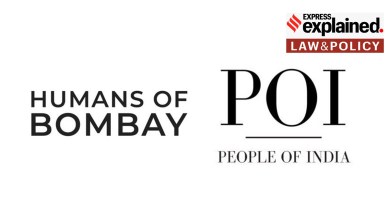Humans of Bombay vs People of India: What is copyright infringement and when does it apply?
Humans of Bombay approached the Delhi High Court, seeking a direction to the People of India to take down all of HOB’s works used either directly or indirectly. But how can claims of copyright infringement or "passing off" be made?

The Delhi High Court has issued summons to an Instagram account called People of India (POI), in a copyright infringement suit filed by the storytelling platform Humans of Bombay (HOB). POI tells stories of common people in a similar way to HOB, whose Instagram account has over 2.7 million followers.
Observing that there was “substantial imitation” of HOB’s storytelling by POI and that in some cases the photographs or images used on the two digital platforms were “identical or imitative”, a single-judge Bench of Justice Prathiba Singh also issued notice to POI and listed the matter for hearing on October 11. Notably, this case involves claims of “copyright infringement” and “passing off”. Here is what the concepts mean in law.
Why did Humans of Bombay approach the HC?
In its plea, HOB said that it owns and operates a storytelling platform in which stories of various individuals are uploaded in the form of interviews, write-ups, posts, etc.
Contending that it engages in “substantial research” and “approaches various subjects who would be interested in narrating their life stories”, HOB added that these stories are then converted into audio-video works and uploaded on its website and social media platforms. The plea also said that POI, whose Instagram account has around 1.5 million followers, had replicated several images and videos from its platforms and used them.
Thus, Humans of Bombay approached the Delhi High Court, seeking a direction to the People of India to take down all of HOB’s works used either directly or indirectly. Significantly, HOB, which launched in 2014, is purportedly inspired by photographer Brandon Stanton’s Humans of New York, which was founded in 2010.
How is “substantial imitation” a copyright infringement?
“Copyright” refers to the right given by the law to creators of literary, dramatic, musical, and artistic works and producers of cinematograph films and sound recordings. Essentially, it’s a bundle of rights that includes rights of reproduction, communication to the public, adaptation, and translation of a work.
The Copyright Act, 1957, aims to safeguard creative works, which are considered to be the creator’s intellectual property.
While acting on HOB’s plea, which stated that POI had created a portal or service identical to theirs, the court found “substantial imitation” between the two. However, what is ‘substantial’ varies from case to case. Often, it is a matter of quality rather than quantity. For example, if a lyricist copies the catchiest part or phrase from another’s song, this will be considered infringement, even if that phrase is short.
And what is copyright infringement?
A copyrighted work will be considered “infringed” only if a substantial part is made use of without authorisation. In cases of infringement, the copyright owner can take legal action against any person who infringes on or violates their copyright and is entitled to remedies such as injunctions, damages, and accounts. An injunction is “an official order given by a law court, usually to stop someone from doing something.”
In HOB Stories Pvt. Ltd. vs. POI Social Media, the plaintiff (HOB) was seeking an injunction restraining infringement of the copyright of its copyrighted content, including its literary works, materials, films, and creative expressions, published on the HOB Instagram handle and YouTube channel.
However, an injunction only acts as a deterrent and does not mean that all alleged instances of misuse will be corrected immediately. This is because even when a court grants it, it is not easy to track all such cases and act on them. HOB might have to separately issue takedown orders to online intermediaries like Google for removing the infringed works.
Besides copyright infringement, HOB’s plea said that the similarities between the infringing content and its own amounted to “passing off and unfair competition”, as POI had “evidently, knowingly and deliberately, published content that is identical or substantially similar to the popular Content comprised of Plaintiffs Works in an attempt to ride on goodwill that has been painstakingly built by the Plaintiff,” it said.
What is passing off?
Suppose a brand logo is misspelt in a way that’s not easy for the consumer to discern. In such cases, the infringing products need not be identical, but the similarity in the nature, character, and performance of the goods of the rival traders has to be established, as laid down by the Supreme Court in Cadila Healthcare Limited vs. Cadila Pharmaceuticals Limited (2001).
To make a claim of ‘passing off’, some form of deception, misrepresentation, or harm to the goodwill and reputation of the owner of a mark has to be established.
In its 2001 ruling, the court also said that passing-off is a “species of unfair trade competition or of actionable unfair trading by which one person, through deception, attempts to obtain an economic benefit of the reputation which other has established for himself in a particular trade or business”.
What did the Delhi HC order?
On September 18, Justice Prathiba Singh issued summons and notice to the defendant, POI Social Media Private Limited.
Directing HOB’s counsel to file an affidavit within a week on how the Delhi HC would have jurisdiction in the present case, the court said that on October 11, the next date of hearing, it will consider HOB’s interim application for ad-interim relief or temporary relief.
The order was passed on an application for interim relief filed by HOB Stories Private Limited, seeking to restrain POI from appropriating the former’s “unique format of storytelling” and publishing the same stories on its platform.